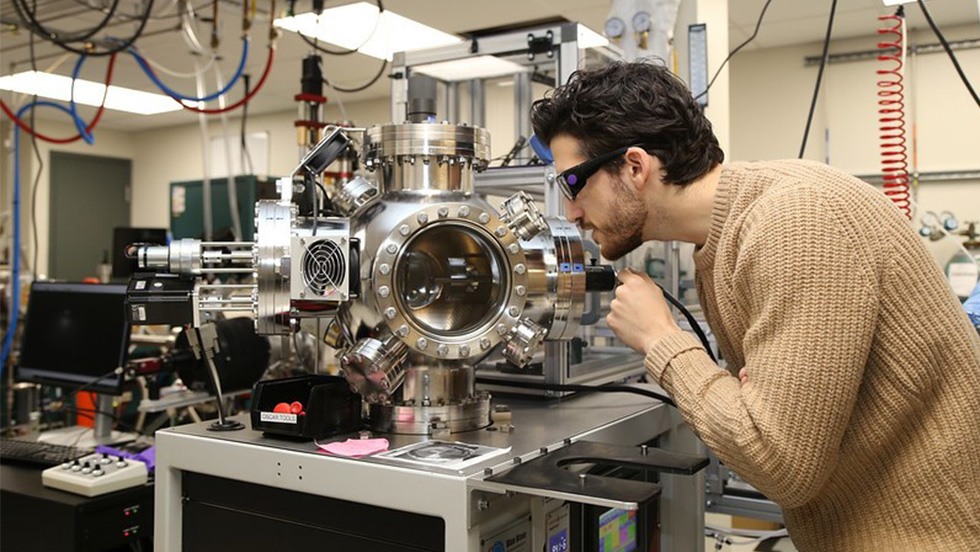Caretta earns CAREER Award from the National Science Foundation
The early-career grant will enable Lucas Caretta to broaden the accessible materials palette for next-generation spintronic devices and enable new experimental approaches to controlling spin transport in a growing field that has a thirst for new materials approaches.
Lucas Caretta, the Howard M. Reisman ’76 P’09 assistant professor of engineering at Brown University, has been awarded a Faculty Early Career Development grant from the National Science Foundation.
The CAREER program is the federal agency’s most prestigious honor in support of early-career faculty and will provide Caretta with $780,000 over a five-year period. The aim is to support early-career faculty who have the potential to serve as academic role models in research and education and to lead advances in the mission of their department or organization.
Caretta will use funding from this grant to investigate novel materials that efficiently convert electrical charge currents into spin-polarized currents—an essential capability for next-generation spin-based logic and memory. This research will uncover intrinsic mechanisms of spin-current generation and pave the way for scalable spintronic computing enabled by advances in materials physics. He will also develop integrated educational programs to help train the computing and chip manufacturing workforce in Providence, R.I. By creating programs that enable local high school students to explore the nanofabrication cleanroom facilities at Brown and beyond, participants will explore career paths in computing and quantum science. Caretta is also working to update Brown Engineering’s materials science undergraduate lab curriculum to include thin film processing and measurements sections, inviting student interest in quantum materials research.

Thin film quantum materials are synthesized in Caretta’s lab using atomically precise pulsed laser deposition, shown here.
At Brown, Caretta leads a research team that designs quantum materials at the atomic scale with tailored magnetic, electronic, and optical properties. His research approach uniquely combines epitaxial, atomic-scale thin-film synthesis with advanced in-situ characterization techniques, addressing fundamental nanoscale questions to overcome large-scale technological challenges. Caretta’s work is situated at the intersection of fundamental oxide materials physics and innovative device applications. The quantum materials his team develops, the physical phenomena they uncover, and the devices they prototype hold broad potential for advancing energy-efficient, high-performance memory and logic technologies, quantum information science, advanced sensing systems, and energy conversion applications..
He came to Brown in the fall of 2022, after completing his postdoctoral studies in the Ramesh Lab at the University of California, Berkeley where he was a President’s Postdoctoral Fellow and a Ford Foundation Postdoctoral Fellow. He received his B.S. from the University of Minnesota and his Ph.D. in Materials Science and Engineering at the Massachusetts Institute of Technology as an National Science Foundation Graduate Student Fellow and GEM Consortium Fellow. He was awarded the 2024 International Union of Pure and Applied Physics (IUPAP) Early Career Scientist Prize in the field of Magnetism, and in 2023, he was one of three researchers under 40 awarded an iWOE Prize in Oxide Electronics for Excellence in Research at the 29th International Workshop on Oxide Electronics held in South Korea.
Caretta joins a group of 19 Brown Engineering faculty who have been awarded grants as part of the CAREER program, including Nora Ayanian (2016), Yuri Bazilevs (2011), Kareen Coulombe (2021), Tejal Desai (2000), Pedro Felzenszwalb (2008), Franklin Goldsmith (2016), Pradeep Guduru (2006), Dan Harris (2024), David Henann (2016), Robert Hurt (1996), Tayhas Palmore (1998), Andrew Peterson (2016), Tom Powers (2001), Sherief Reda (2010), Anita Shukla (2020), Kimani Toussaint (2010), Axel van de Walle (2010), Alex Zaslavsky (1997) and Rashid Zia (2009).